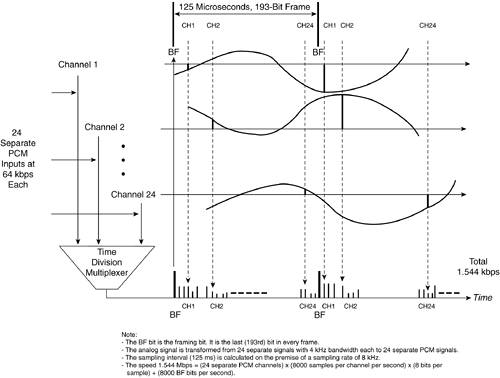TDM
| Unlike FDM, TDM is based on the time-division of the channel, which performs time-sharing rather than frequency-sharing, and obeys the rule " all the bandwidth, some of the time." This concept is shown in Figure 3-2, where a digital signal level 1 (DS-1) is subdivided into 24 channels. Figure 3-2. Time-Division Multiplexing (TDM) Technology Where 24 DS0 (64 kbps) Channels Are Time-Sharing a 1.544-Mbps DS-1 Each of the PCM samples is interleaved in time sequence into a single high-speed digital signal that begins with a signal that is referred to as channel 1 and ends with a signal that is referred to as channel 24. The process is repeated for 8-bit samples from each channel for 24 x 8 = 192 bits. The following bit (number 193) is the framing bit; it is used for time synchronization. The frame is a sequence of time slots, with each slot containing a sample from one of the channels. Given an 8-kHz frame rate, the sampling interval is 125 micro-seconds, and each frame consists of 24 time slots. Therefore, 24 channels multiplied by 64 kbps for each PCM input yields 1.535 Mbps. If you add the BF bit for every sampling interval, the overall rate is 1.544 Mbps. The multiplexor loads the time slots with bits and the de-multiplexor removes them on the receiving side. The recipient of the bits is determined by the position of the bits in the data stream. The exchange of bits in a predefined time slot is also known as synchronous TDM, and refers to the fact that the time slots are fixed and preassigned. This scheme requires perfect timing and synchronization between sources. TDM is not limited to digital signals because analog signals can be interleaved too. Unlike synchronous TDM, asynchronous TDM allows time slots to be allocated dynamically. It is possible to combine FDM and TDM in one medium, where the transmission media can be subdivided into a number of channels and every one divided by time for TDM. |
EAN: 2147483647
Pages: 235
